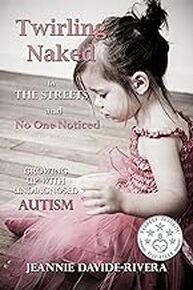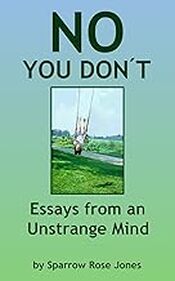Twirling Naked in the Streets and No One Noticed: Growing Up with Autism by Jeannie Davide-Rivera, eBooks 2013 Edition; an Extended Review with < My Thoughts > by Sara Luker
Excerpts from the book – (4% indicates location in the Kindle version of the book, instead of page numbers).
4% They missed it; they missed me. I am a survivor; an autism survivor.
< My Thoughts > “They missed it; they missed me.”
Children on the Autism Spectrum often go unnoticed until their environment/setting makes more demands on their behavior and/or performance. Sometimes they are even missed until they find themselves in a demanding workplace. Difficulties arise, causing anxiety issues and hyperactive behavior.
4% I’ve heard people say that they didn’t see many autistic children when they were growing up, but I am here to tell you that we indeed were in your midst.
4% When I couldn’t stand certain fabrics touching my body, I was being a princess. When I cried and screamed, I was spoiled. When I rocked back and forth, I was concentrating. When I sat alone, I was in my own world.
< My Thoughts > “When I couldn’t stand certain fabrics touching my body…”
Sensory problems can be so complex, often causing persons with autism to be put into long lasting ‘behavior treatment’ programs which aren’t very successful. That’s because they’re being treated for their responses to unidentified sensory issues, and not for the challenging behavior the program was designed for.
Sensory issues are valid and very real. At home, the kind of soap used to wash the child or their clothes can make a real difference in their comfort level… how it smells and how it feels on their skin. At school, the computer screen or room lights too bright, room temperature fluctuations, uncomfortable chairs, or even the smell of whiteboard markers can create real physical pain for the student; overriding any chance of the child focusing on lessons.
Note: Find on MENU - My FREE ASD Book; Unit 4 Sensory Issues
4% When I couldn’t keep up, I was not living up to my potential. When I didn’t think the way others did, I was just too smart for my own good. When I didn’t connect with my peers, I just didn’t care about them. When I misinterpreted situation, I was inconsiderate. When I inserted myself, I was inappropriate.
When I stayed in my pajamas for days, I was depressed. When I was overwhelmed by the world, I was agoraphobic. When I was tired and frightened, I had an anxiety disorder. When I realized something was wrong with me, I was making excuses. I was agoraphobic.
< My Thoughts > “I was agoraphobic.”
According to Cornacchio, et al. (2015), “Left untreated, agoraphobia is associated with decreased well-being and daily functioning” … and is correlated with other things such as depression and substance abuse.
Sometimes, you must convince the doctor to say something like… “Patient is suffering from depression (which insurance will cover for treatment & medication), and she also presents ‘agoraphobic’ tendencies. Next, is to find the treatment & medication that will reduce both the patient’s depression and agoraphobia. Sorry, but you often must understand the system and learn to play the game, before you can get the help you need.
95% As a child, I was carefree – happy, as I knew happy to be at the time. But when I grew into a young woman life got messy, and continued to come unraveled as time went on. I had difficulty making friends, raising children, and communicating with my husband largely due to my autism.
< My Thoughts > “I had difficulty making friends, raising children, and communicating with my husband largely due to my autism.”
Receiving and dealing with an Asperger’s diagnosis can cause a huge shift in one’s adult life. Hartwell-Walker (2011) shares how her Aspie client explains receiving diagnosis, therapy, and learning the code for getting along. She says, “For many, diagnosis was a relief because as children, “teachers found them exasperating, disorganized and uneven in their academic performance despite being clearly bright.”
5% Everything was my fault!
No one recognized my autism; no one saw that I had Asperger’s syndrome. How could they? “Aspies” did not exist; not yet.
I rejoice in my Aspie-ness, and if you are on the spectrum, or someone you love is, you should too.
< My Thoughts > "I rejoice in my Aspie-ness."
Her Aspie-ness shines as she rewards us with an understanding of why they say “autism spectrum.” And, all the rest of her life is so worth reading about.
References:
Cornacchio, D., Chou, T., Sacks, H., Pincus, D. Comer, J. (2015). Clinical Consequences of the Revised DSM-5 Definition of Agoraphobia in Treatment-seeking Anxious Youth; Depression & Anxiety, 32:502-508.
Hartwell-Walker, M. (2011). Adult Asperger’s: The Relief of A Diagnosis; Retrieved online from: http://psychcentral.com/lib/adult-aspergers-the-relief-of-a-diagnosis/


 RSS Feed
RSS Feed